
|
|
|
|
|
|
|
|
|
|
| |
|
(1974) Director: Robert
Taylor
I have never found any of Ralph Bakshi's animated
feature films to be overall worth the effort of watching them in their
entirety, including his famous first entry into adult animation, Fritz
The Cat (which was recently made available again with MGM's
releasing of a
DVD
edition.) About the Despite its quality, many people still seek Fritz The Cat out - at the very least most everyone has some knowledge of it, because as the tagline stated, "It's X-rated... and it's animated!" Curiously, not many people seem to know about the other X-rated animated movies out there for some reason. Even more strange is the fact that despite it being so well-known even among the many who haven't actually seen it, few people - even those who have seen and loved Fritz The Cat - seem to know that the movie had a sequel. Especially since the sequel was R-rated and therefore more accessible. This sequel even played at the Cannes Film Festival as an official entry, believe it or not. Its name was The Nine Lives Of Fritz The Cat, and it was produced by many of the same people who were behind the first movie, though Bakshi wasn't involved this time around. For years I found it nearly impossible to find any information about this sequel, except that it was a failure at the box office and dismissed by critics with nary a word. So when I finally got to see this unknown movie, I thought that because it had faded into obscurity so much, that it must be even worse than the original. To my surprise, I actually found this sequel to be an improvement. Though to be honest, the amount of improvement can make it comparable with eight or nine swift kicks to the shins instead of ten. The original movie took a look at America of the 1960s,
and the sequel is a look at America in the 1970s... or at least that's
what the opening title and narration claim this movie to
be. Though Fritz is still voiced by Skip Hinnant (one If it sounds like The Nine Lives Of Fritz The Cat is more concerned than the original with creating gags and zany situations than it is in making any kind of social commentary (of the '70s or any other time), you are right. Still, given how the original failed to bring any special insight to the '60s, satiric or otherwise, the expanded range this sequel had to wander around in did at least provide a lot more opportunities to mine humor. But all of this material the movie had to its disposal is to no avail; despite the fact there are eight different stories (nine if you count Fritz's present like), perhaps only one of them could qualify to earn the label "funny". As for the other stories, there are maybe only enough laughs in them to equal the amount found in that other story. To say that the level of writing that's offered in the
script (credited to three screenwriters) is bad isn't quite accurate. I
think a word that better describes the main problem with the writing is
not "bad", but "unimaginative". That may seem a strange way to put it,
considering some of the wacky There are other stories that come across as equally pointless as that one. One story has Fritz getting away from the hustle and bustle in the city by seeing refuge in the sewer. He meet a guru from India who babbles on for several minutes about how he's seeing those afflicted with leprosy. When the guru finds out there none, he leaves for Philadelphia. Seconds later, Lucifer appears, and Fritz finds out that The Dark One is gay. Then the story abruptly ends. Another "story" has Fritz reminiscing about his life in the 1930s, but all it consists of is Fritz dancing around in a tux over old live-action B&W footage, followed by a montage of neon signs and marquee lights that repeatedly light up Roosevelt's message of "NOTHING TO FEAR". And once that's over, the "story" ends. The fact that about half of the stories in The Nine Lives Of Fritz The Cat don't seem to have been properly thought out may be explained by reports that much of the work initially completed for the movie was scrapped and redone when the Watergate scandal hit the world. This may not only explain why many of the stories feel both rushed and unfinished, but also why a lot of animation gets reused over and over, as well as the fact that the total amount of live-action footage is even more than the amount Bakshi typically used in one of his movies. Apart from those quirks, the level of animation in this
movie is pretty good - in fact, I'd say it's a notch or two above the
artistry found in the first Fritz The Cat The story concerning Fritz unwittingly becoming trapped between the warring all-black New Jersey and The United States actually comes close to working. The sequence is ultimately brought down by going the easy way out too many times (as well as a very self-indulgent and completely unnecessary wordless segment at its end), but there are some interesting moments along the way. Unlike the other stories this one does bring a political agenda, which is quite biting at times. It also has a few surprisingly effective moments that are serious, such as when a "white" animal pleads with our cat (who is preparing to enter New Jersey to deliver a message) to keep an eye out for his black wife and their mixed-raced son. The sequence explores the idea of an all-black state (actually argued by some black leaders of the '70s), and savagely shows that it would probably not be the paradise those leaders claimed it would be, showing that the worst of humanity can be found in any race. This is seen in one sequence when Fritz in New Jersey encounters a man brutalized by muggers, and finds no one else seems willing to help. It also leads to the funniest moment in the movie, when Fritz tries to call for help on a pay phone and is connected to an operator who somehow manages to misunderstand everything he says. That sequence made me laugh, and I must admit that every
so often in the movie there was a sight gag, a pun, a funny one-liner,
or some other gag that made me laugh as well. But despite the
occasional gem of a gag,
Check for availability on Amazon (VHS) See also: Let My Puppets Come, Once Upon A Girl, Pinocchio In Outer Space |
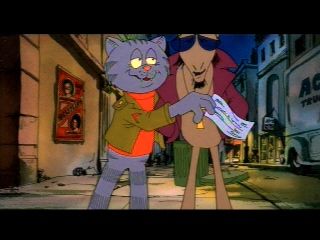 kindest thing I can
say about it is that it's free of Bakshi's annoying habit of using
(bad) rotoscoping, as well as it being virtually free of his other
annoying habit of lazily using live-action stock footage instead of
going to the trouble of actually animating the sequence in question. As
for the rest of the movie, putting aside the obvious fact that it's
quite dated in its attitude, I find it to be incredibly annoying; it
feels like someone is shouting non-stop in your ear for an hour and a
quarter. The characters, when not seen as blatant stereotypes with no
satiric characteristics in sight, are unbelievably strident with their
one-note personalities that are obsessed with sex and/or drugs. Scene
after endless scene, Bakshi puts these ink-and-paint creations to
plotlessly display utter gratuitousness with a slapstick presentation;
it's obvious Bakshi was more interested in the animation and display of
shock value instead of making any kind of insight into various
personalities or '60s culture. No wonder Robert Crumb hated this
adaptation of his underground comic character.
kindest thing I can
say about it is that it's free of Bakshi's annoying habit of using
(bad) rotoscoping, as well as it being virtually free of his other
annoying habit of lazily using live-action stock footage instead of
going to the trouble of actually animating the sequence in question. As
for the rest of the movie, putting aside the obvious fact that it's
quite dated in its attitude, I find it to be incredibly annoying; it
feels like someone is shouting non-stop in your ear for an hour and a
quarter. The characters, when not seen as blatant stereotypes with no
satiric characteristics in sight, are unbelievably strident with their
one-note personalities that are obsessed with sex and/or drugs. Scene
after endless scene, Bakshi puts these ink-and-paint creations to
plotlessly display utter gratuitousness with a slapstick presentation;
it's obvious Bakshi was more interested in the animation and display of
shock value instead of making any kind of insight into various
personalities or '60s culture. No wonder Robert Crumb hated this
adaptation of his underground comic character.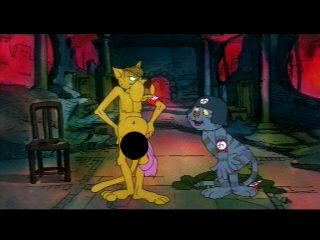 of the cast members
of the classic children's TV show The Electric Company!) most
everything else in this feline's life has changed in the past several
years. Fritz is no longer a college student ambling on the fringe of
society, but has now settled down in domestic bliss. Actually, make
that domestic hell; the furry feline is now a welfare bum, trapped in a
crappy apartment with a screaming and complaining wife as well as his
sex-obsessed infant son. One night during one of his wife's endless
rants, he smokes a reefer so that he can at least escape his hell
through his mind. During his hallucination, he thinks back to his eight
previous lives in order to find at least some kind of pleasant memory
to grasp and cherish, and these eight stories are what make up most of
the remaining running time. The stories range from situations that are
could have fit with little difficulty in the narrative of the original
movie (Fritz trying to seduce the sister of a friend of his, trying to
cash his welfare check at a drug store run by his untrusting Italian
neighbour, meeting a wino in the ghetto who claims to be God, etc.) to
situations where the environment is completely different (Fritz as an
astronaut, an aide to Hitler in the closing days of World War II, a
lowly courier caught in the struggle when the American government
clashes with the newly seceded all-black New Jersey, etc.)
of the cast members
of the classic children's TV show The Electric Company!) most
everything else in this feline's life has changed in the past several
years. Fritz is no longer a college student ambling on the fringe of
society, but has now settled down in domestic bliss. Actually, make
that domestic hell; the furry feline is now a welfare bum, trapped in a
crappy apartment with a screaming and complaining wife as well as his
sex-obsessed infant son. One night during one of his wife's endless
rants, he smokes a reefer so that he can at least escape his hell
through his mind. During his hallucination, he thinks back to his eight
previous lives in order to find at least some kind of pleasant memory
to grasp and cherish, and these eight stories are what make up most of
the remaining running time. The stories range from situations that are
could have fit with little difficulty in the narrative of the original
movie (Fritz trying to seduce the sister of a friend of his, trying to
cash his welfare check at a drug store run by his untrusting Italian
neighbour, meeting a wino in the ghetto who claims to be God, etc.) to
situations where the environment is completely different (Fritz as an
astronaut, an aide to Hitler in the closing days of World War II, a
lowly courier caught in the struggle when the American government
clashes with the newly seceded all-black New Jersey, etc.)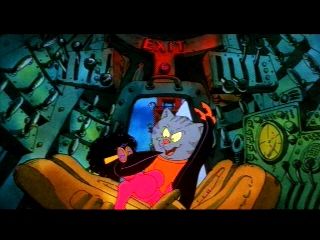 situations I
described earlier, but I'll get to them in a moment. First I'll
describe how unimaginative the more "normal" adventures that Fritz has,
all taking place in his ghetto neighbourhood. Though taking place in a
more familiar and believable environment, they could have
been funny; sometimes twisting around familiar activities and/or
showing their absurd side can be hilarious. But in this movie, the
familiar is mostly presented in a... well, familiar manner. Take
Fritz's first hallucination, where he meets a friend of his and
arranges to meet his sister. The next thing we know, he's at the home
of his friend's sister, sitting with her on the couch. He smokes some
pot, and soon starts to strip and seduce her. They roll around, her old
man comes in, and blows Fritz to bits with his shotgun. End of story.
You might not think that it plays out as lame as it reads here, but it
pretty much does. Oh, there is the makings of a subplot concerning a
couple of burglars who are lurking outside of the house planning to rob
it, but they just end up being a Greek chorus to the action inside when
they get to the window ("He's gonna screw her!" etc.)
situations I
described earlier, but I'll get to them in a moment. First I'll
describe how unimaginative the more "normal" adventures that Fritz has,
all taking place in his ghetto neighbourhood. Though taking place in a
more familiar and believable environment, they could have
been funny; sometimes twisting around familiar activities and/or
showing their absurd side can be hilarious. But in this movie, the
familiar is mostly presented in a... well, familiar manner. Take
Fritz's first hallucination, where he meets a friend of his and
arranges to meet his sister. The next thing we know, he's at the home
of his friend's sister, sitting with her on the couch. He smokes some
pot, and soon starts to strip and seduce her. They roll around, her old
man comes in, and blows Fritz to bits with his shotgun. End of story.
You might not think that it plays out as lame as it reads here, but it
pretty much does. Oh, there is the makings of a subplot concerning a
couple of burglars who are lurking outside of the house planning to rob
it, but they just end up being a Greek chorus to the action inside when
they get to the window ("He's gonna screw her!" etc.)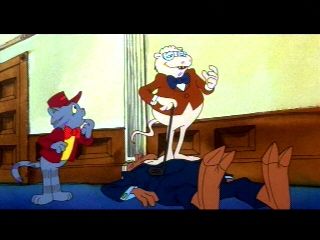 movie. Though by today's
standards it may not be considered very elaborate, for the period it
looks pretty polished - unlike Disney movies of the time, which had a
roughness to it coming from their practice of Xeroxing their pencil
sketches onto celluloid. The backgrounds have a good amount of detail
to them, and they and the characters in front of them are colored with
bright and warm hues. Still, good animation isn't enough to save a
badly written story, and this is true even during the times when the
writers have Fritz in a story with quite a bit of potential. When Fritz
becomes an astronaut, the biggest idea the writers come up with is to
have Fritz take a female report into the rocket before it launches so
he can have sex with her, making the rocket bounce up and down before
it launches (ha ha). When Fritz encounters Hitler, the big gag is to
make Fritz psychoanalyze Hitler, deducting that he is waging war
because he is lonely, which subsequently gets Hitler to develop a lust
for Fritz.
movie. Though by today's
standards it may not be considered very elaborate, for the period it
looks pretty polished - unlike Disney movies of the time, which had a
roughness to it coming from their practice of Xeroxing their pencil
sketches onto celluloid. The backgrounds have a good amount of detail
to them, and they and the characters in front of them are colored with
bright and warm hues. Still, good animation isn't enough to save a
badly written story, and this is true even during the times when the
writers have Fritz in a story with quite a bit of potential. When Fritz
becomes an astronaut, the biggest idea the writers come up with is to
have Fritz take a female report into the rocket before it launches so
he can have sex with her, making the rocket bounce up and down before
it launches (ha ha). When Fritz encounters Hitler, the big gag is to
make Fritz psychoanalyze Hitler, deducting that he is waging war
because he is lonely, which subsequently gets Hitler to develop a lust
for Fritz.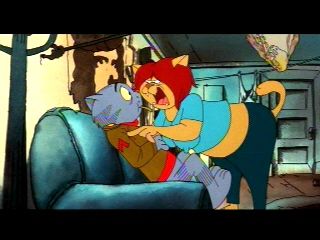 I just didn't find any of the stories funny enough overall
to like... except for one. That was the surrounding story, where Fritz
is sitting stoned on his couch and having to listen to his wife's rants
and raves, which the movie keeps cutting back to momentarily between
each hallucination Fritz has. Just about everything Fritz's wife says
is hilarious, whether it's her demanding that Fritz go on Let's
Make A Deal and dress Jewish so that he'll get picked, or that she
is forced to plug the holes in her diaphragm with Chapstick because she
doesn't have the money to buy a new one. As well, there are also some
tasteless but equally hilarious sight gags with Fritz's diaper-clad son
(named "Ralphie" - a dig at Bakshi?) If you should want to watch The
Nine Lives Of Fritz The Cat so you can see these funny
sequences with Fritz's family for yourself, I suggest you get the DVD;
as it happens, the chapter stops are conveniently placed so you can
easily skip over the eight other stories and watch these rants almost
non-stop. Then you won't have to face the almost complete agony of the
other 70 or so minutes.
I just didn't find any of the stories funny enough overall
to like... except for one. That was the surrounding story, where Fritz
is sitting stoned on his couch and having to listen to his wife's rants
and raves, which the movie keeps cutting back to momentarily between
each hallucination Fritz has. Just about everything Fritz's wife says
is hilarious, whether it's her demanding that Fritz go on Let's
Make A Deal and dress Jewish so that he'll get picked, or that she
is forced to plug the holes in her diaphragm with Chapstick because she
doesn't have the money to buy a new one. As well, there are also some
tasteless but equally hilarious sight gags with Fritz's diaper-clad son
(named "Ralphie" - a dig at Bakshi?) If you should want to watch The
Nine Lives Of Fritz The Cat so you can see these funny
sequences with Fritz's family for yourself, I suggest you get the DVD;
as it happens, the chapter stops are conveniently placed so you can
easily skip over the eight other stories and watch these rants almost
non-stop. Then you won't have to face the almost complete agony of the
other 70 or so minutes.